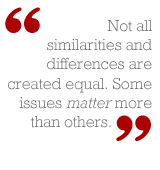







|
Similarity: Birds of a Feather
As I write this session, I can peer out the window beside my home computer and survey the flowers and the vegetable garden my husband
has planted. Birds of a feather are indeed gathering! I can readily see that crows hang out with crows, strutting along the new rows to
peck out the seeds put there. Gangs of mockingbirds chatter from our bird feeder, dive-bombing at our cat as he ambles below. What might
these birds accomplish if they cooperated across species lines?
For that matter, why do humans "flock"? We like people who are "of a feather" with us, who share similar or possess similar
characteristics, attitudes or interests. This commonality is the basis of your communication with another person, the substance of
your relationship. It has been said that relating is communicating. Well, similarity is what we generally communicate about.
Our first conversations with other people are generally efforts to discover common ground. We ask things like, "Hi! Come here often?" or
note things we particularly connect with ("I see you're reading the new Stephen King novel. I just finished it! What do you think of
it?"). When I was a college student, my friends and I joked about reciting a run-on question with new acquaintances:
"What's-your-name-what's-your-major-where're-ya-from?"
If it turns out you have little or nothing in common with a new person, you are not likely to pursue an interaction (unless he or she
is extremely attractive in some other way, as we'll see in the next section). And even if you discover many shared interests,
attractiveness might not be enough to overcome other problems. Remember the "Seinfeld" episode in which a woman who Jerry initially
found so appealing turns out to have an incredibly loud, annoying laugh? They had so much in common -- but all their similarities were
not enough (for sitcom purposes!) to overcome Jerry's distress over the woman's obnoxious braying.
Similarity, A Matter of Degree
Maybe you and a new acquaintance discuss many different topics -- from the best place to go for Mexican food to Eminem to "Survivor" --
agreeing on most of the many topics you touch on, if only a little. Research suggests that you will get the impression of deep agreement
between you because you seemed similar on a high proportion of the topics you discussed.
Humans perceive and remember proportions, not absolutes. For example, let's say you chat with two people at a social gathering,
Alex and Barrie. You and Alex only discuss two subjects but you agree on both. You and Barrie cover a dozen topics in your wide-ranging
conversation, agreeing on six. Whom do you like better -- Alex or Barrie? Research says the more "agreeable" person will seem to be
Alex -- your two-for-two discussion left you with 100% agreement, in contrast with Barrie's 6 out of 12 agreements, a bigger number of
subjects but a mere 50% agreement. Again, it's proportions that matter in similarity-based attraction, more so than numbers of topics.
What's the lesson in this? For first encounters and early interactions, if you want a given individual to like you, the
lessons might be simply to keep the conversation focused and emphasize how much you concur with your new acquaintance. Don't lie
or pretend to enjoy things you don't! For example, if your friend raves about hockey and you can't stand winter sports, steer the
conversation back to things you do have in common -- the films of Quentin Tarantino, Asian cooking, hiking with your dogs.
By sticking to what you agree on, you leave your new friend with an overall impression of similarity, regardless of how many (or how
few) topics you've covered in your discussions. Remember too that the goal of these early conversations, like dates, is not to bare your
soul and tell all. It's too soon for that! (Wait till our Session 5 before you have any heart-to-heart confessionals with a new love -- if you can). The goal
is rather to get to know someone -- and to leave each interaction with the hope and promise of another. Do you want to talk to this
person again? Would he or she want to talk to you again? The less you seem to have in common, the less likely another interaction will be.
Similarity Is Validating
Perhaps you and a friend agree on only a few interests or pastimes but in those areas you agree a great deal. For example, when my
husband and I first met over 20 years ago, we perceived each other as seeming different in style, occupation and interest. But as we
talked, we learned we had both grown up in the same part of the country, were raised Catholic and were from large families. We soon
discovered we agreed substantively about politics, life values, how we hoped to live our lives. Suddenly stylistic differences between us
seemed utterly superficial.
Not all similarities and differences are created equal. Some issues matter more than others. My friend Maggie once found
that many new relationships ended when, as conversations got less superficial, she and her dates disagreed about politics. "I've found
I can save a lot of grief by just asking one question on the first date -- 'Whom did you vote for?' If we don't agree on that much,
there's no point at all in going any further!" This may be a bit extreme but for Maggie disagreement in this important area mattered
more than lots of agreement about food, fun and frolicking.
Dissimilarity and Disagreement
Similarity is, in essence, being agreed with. Others' agreement constitutes a sort of proof or validity; as discussed in
Session 2. It helps us to feel right in our beliefs -- a very rewarding state of mind! That is why when we feel dissimilar, when we
disagree, relationships can falter.
In one of the opening vignettes, Allison's friend Deborah pressures her to join her religious community. Deborah needs
Allison's agreement; such validation would support Deborah's faith and "prove" that her beliefs must be correct after all. What happens
if such agreement is not forthcoming? Deborah won't enjoy the company of the "nonbeliever" Allison -- it will limit Deborah's ability to
express herself. Allison likewise will tire of having too narrow a range of conversation.
It is often the case that a friendship cannot withstand the challenge of disagreement. Even solid friendships have trouble when
one person changes in a way the other cannot support. So it is possible to "lose" a friend or lover to a new interest or conviction.
Some friends and lovers find it possible to "compartmentalize" or isolate the problem issue, keeping it out of conversation or gently
changing the subject if it does come up. This is easy if you don't encounter the other person a lot; it's harder to change the subject
when you interact frequently with someone. Frequent interactions require you to at least get along, even if you don't become close.
Research shows that we try to match "sentiment" relationships (liking someone) with "unit" relationships (roles or interactions, such as
being in the same car pool).
If you know you'll be seeing a lot of someone, like your sister's new husband, you know it makes sense to at least try to like that
person. The alternative is painful; why make your life difficult? Be pleasant, fake it a little, maintain civility. In time, you may find
that he's not such a bad guy after all! And at the very least, you'll maintain good relations with others who must get along with both of you.
Similarity and Identity
The greatest benefit afforded by similarity to another is to your sense of self. Your self-concept is essentially how you think
of or conceptualize your identity. Your self-concept derives from two sources: personal identity and social identity.
Background issues -- where you come from, what you learned, how you were raised, your childhood experiences, socioeconomic status, class,
race and religious upbringing are the areas of potential agreement that matter most.
"But those things don't define who I am today!" you might protest. Maybe that's not how you define yourself today but those are your
roots, and those roots are key to your self-concept. Someone who respects and appreciates both where you have been and what you are
now provides you with the most valuable validation. Your personal identity consists of the traits and qualities you possess.
Your social identity consists of the relationships, roles and memberships that contribute to the person you are. Are you
someone's sibling? spouse? a Celtics fan? a liberal Democrat? member of the National Rifle Association or People for the Ethical Treatment
of Animals? Such associations build on personal identity: our likes and dislikes, traits and tastes. Even more, this part of you is not
merely a matter of interest, it's a foundation for knowing and becoming close to others. By establishing similarities with others , you not only establish
relationships, you develop yourself.

|



